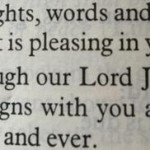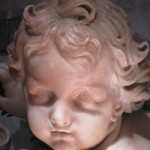When Jesus went into the region of Caesarea Philippi he asked his disciples, “Who do people say that the Son of Man is?”
They replied, “Some say John the Baptist, others Elijah, still others Jeremiah or one of the prophets.”
He said to them, “But who do you say that I am?”
Simon Peter said in reply, “You are the Messiah, the Son of the living God.”
Jesus said to him in reply, “Blessed are you, Simon son of Jonah. For flesh and blood has not revealed this to you, but my heavenly Father.
And so I say to you, you are Peter, and upon this rock I will build my church, and the gates of the netherworld shall not prevail against it.
I will give you the keys to the kingdom of heaven. Whatever you bind on earth shall be bound in heaven; and whatever you loose on earth shall be loosed in heaven.” – Matthew 16:13-19
Continuing my slow read through Matthew this Lent, I was struck to realize that imperfect, imprudent Peter was the first to confess Jesus as Messiah to his face. That would be in keeping with Peter, who was emotional, responsive and quick to jump headlong into things, both for better and for worse.
I’m also struck by Jesus saying “upon this Rock I will build my church and he gates of (‘the netherworld’) hell will not prevail against it.”
In that one statement are two very interesting ideas we tend to glide over. The first is the understanding that the “netherworld” – the supernatural realm – is to be engaged, and so we may infer that the church Jesus is forming is to be a church that is highly charged with the supernatural, itself. This will be no earthbound entity. Rather, this church, what Jesus called “my church” is to imbued with a supernatural holiness – Jesus’ own – the only sort of holiness that can withstand the assaults of “the netherworld.”
“You are Peter, and upon this rock I will build my church, and the gates of hell shall not prevail over it.” I know there is some argument in apologetics circles (we do not do apologetics here, so don’t even bother engaging me in it) over whether Jesus was calling Peter a “rock” or a “pebble” and whether he was calling Peter or Himself the Foundation. To me getting hung up on that point tends to overlook the greater point, which is that Jesus did not say this line to Andrew or James or John. He said it to Peter, the First Bishop of Rome. Since nothing in scripture is there by accident, we make take that to be significant.
But what is most particularly interesting to me is the last part of Jesus’ proclamation: “the gates of hell shall not prevail against,” implying nothing less than a constant battle. Note, he did not say, “the gates of hell will never get near it…” instead what we may infer is that there will always be the constant clang and push of evil working in opposition, trying to prevail, and not succeeding, and we see that in the history of the church even up to its present times and the shameful scandals which have come to light in the last decade.
Where there is holiness, evil always exists on the periphery or nearby. Jesus in the desert, tempted by Satan who stood right alongside him. Jesus on the cross, thieves on either side. Where there is great light, darkness is nearby – darkness, in fact, emphasizes the light. Peter, whom Jesus constantly favors among the twelve, (even to paying Peter’s temple taxes) contradicting the Lord when he says he will suffer – and testing the Lord on the waters – is a study in the whole premise of the co-existence of dark and light. He embodies it when he sits outside the preatorium, worrying for Jesus one minute and then denying him the next.
The church of Rome is as faulty and imperfect as its first bishop. The human element will always deliver disappointment and yes, darkness. But in this daily tug-of-war, the constant attempt on one side to push through and overtake, and the constant defense (and counterpush) by the other side, we already know the outcome. The gates of hell shall not prevail.
I wrote earlier that the church would be no “earthbound entity” but that was not completely right. She is earthbounded by man, by the imperfect humanity which must necessarily run the thing in order to bring the truth and reality and Person of Christ to all of us. We would like the church to be perfect, but it never can be because the church, in the end, is us.
If we look at ourselves as microcosms of dark and light – little versions of this big battle – we see it within ourselves. Where there is holiness, evil is always right there, on the periphery, pushing, and too often prevailing. But conversely, if we are decrying our own hearts- of-darkness and the ways that glamorous evil has enticed us, it is urgently necessary to remember that it goes both ways, that the light – and holiness – are also right there, on the periphery, being offered. We need only grab hold of the Rock of Faith and then let ourselves be formed and trained with the weapons of holiness – prayer, contemplation, humility and openness – that the gates of hell may not prevail.
Big church (institution), little church (each of us) the struggle is the same.
Responding to this piece not once, but twice, Siggy demonstrates that he has been drinking the deep waters and he writes:
A House of Worship does not exist for God. A House of Worship exists to facilitate our potential. In the effort to regain Holiness after the ‘darkness’ of our mundane existence, a House of Worship offers us a place to remind us of God’s words and to reconnect with His commandments that serve as guideposts on the path that will elevate us.
Deacon Greg has thoughts on what creates ex-Catholics, following up on this report. And too, Amy Welborn has some thoughtful analysis.
How is your Lenten training going? Fortunately, another powerhouse of prayer will be created, soon. More light.











